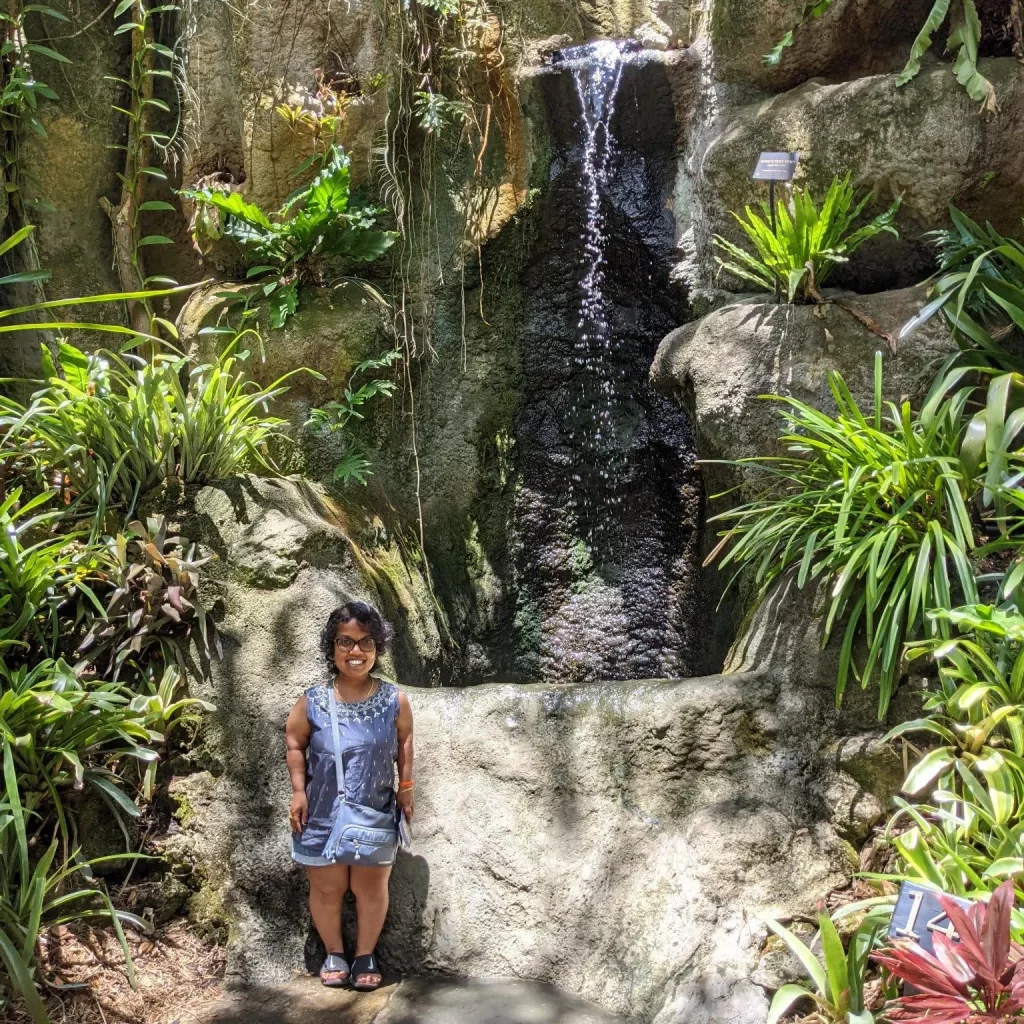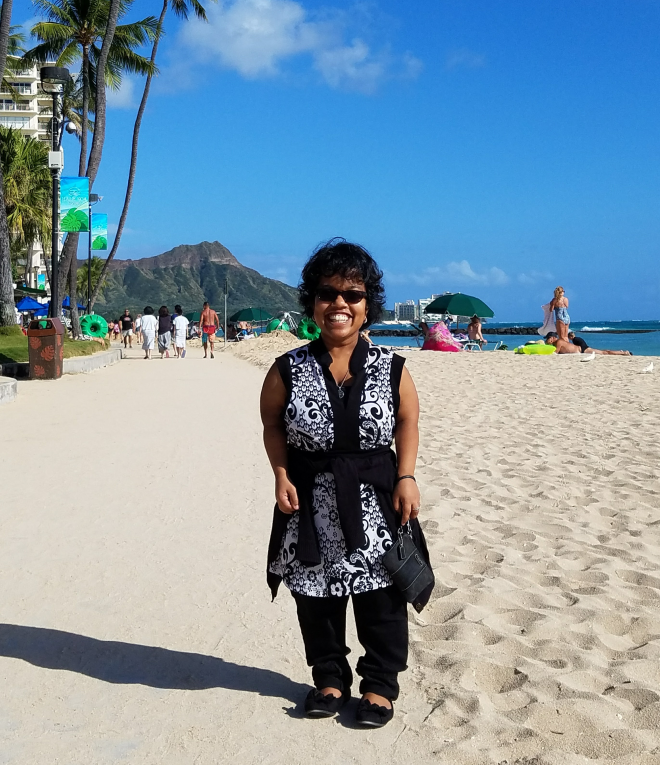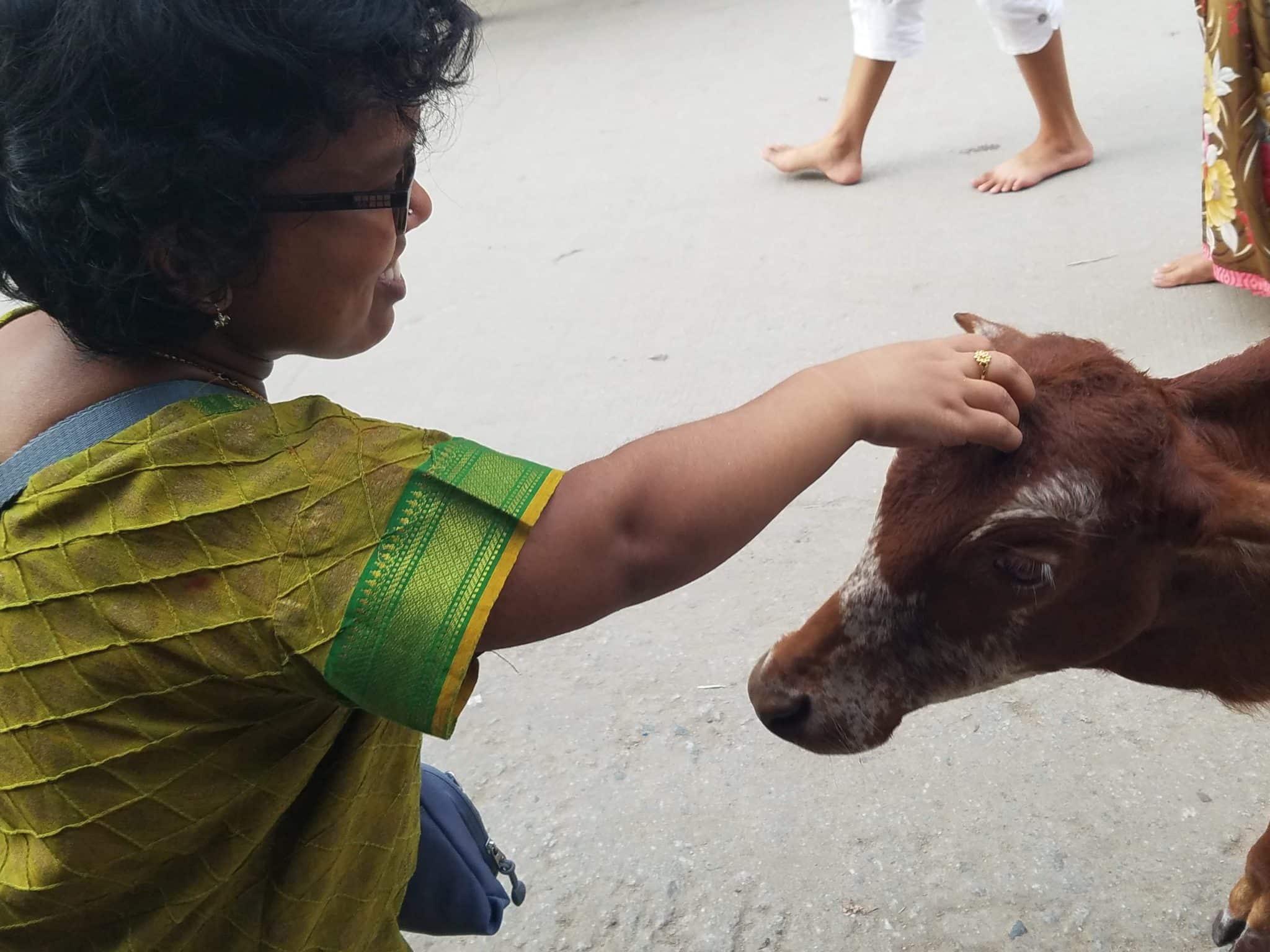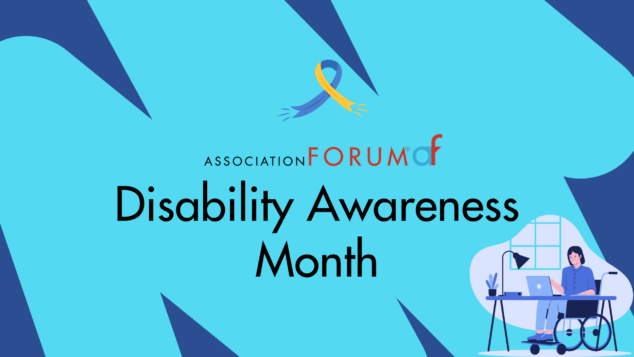Association Forum Member Shares Experience on Living/Working with a Disability

Samyuktha Gumidyala (Neeraja) is many things. She is a well-traveled Indian-American woman; an association professional; a champion of public health; and an advocate for people with disabilities. Neeraja has achondroplasia, the most common type of short-limbed dwarfism. When she talks about the struggles she’s faced due to her disability, she says that the toughest part is “living in a world where you just fight for acceptance; fight for people to see you, and recognize your humanity.”
The oldest of five daughters, Neeraja has a tight-knit family that she describes as “big family, big support.” She calls her sisters her biggest advocates as she describes the discrimination she faces on a daily basis. From grocery shopping to visiting a bar, she faces questions, stares, and sometimes laughter. Neeraja says she’s learned to wear blinders to this sort of behavior. Blocking out the ignorance of others was one way Neeraja feels she takes control of her life and moves through the world on her own terms.
Professionally, Neeraja is like a lot of us—she’s an accidental association professional. She didn’t set out to be the State Associations Relations Manager II at the American Association of Nurse Anesthesiology (AANA), lead committee calls, or work with volunteers.
She started her educational career in biology because she was interested in curing diseases. She quickly learned that the isolation of a laboratory was not for her. Neeraja is engaging, personable, and wears a big grin even as she explains some of the most difficult aspects of living with a disability.
She became interested in community health and healthcare administration, which led her to a Masters of Public Health Degree from Benedictine University. From there, she found her way to the American Osteopathic Association (AOA). Healthcare associations were a good fit, and she’s been in the field for the past six years.
-

Samyuktha Neeraja in Hawaii on a business trip in March 2017. She is standing on Waikiki Beach with the Diamond Head volcano in the background.
A Daily Struggle
Neeraja isn’t the type to shy away from a challenge. She volunteers her time in disability advocacy work, as well with as her alma mater. She openly says she’s had to work 10 times as hard for opportunities in her life. While many would be exhausted by the daily barrage of challenges, it seems to have fortified her spirit and made her both resilient and determined to succeed.
At 3 foot 9 inches, the world is not designed for Neeraja. She describes having stools all over her home to reach counters, sinks, and shelves. She has to ask fellow shoppers to reach the high shelves at grocery stores. She remembers a time when she felt this burden was too much and her desire for independence stopped her from asking for help. Speaking with her now, she seems to have adopted a strong sense of self and doesn’t shy away from asking for what she needs. Plus, she’s learned that her own success is important in terms of representation for the disabled community. She writes a travel blog, co-hosts a podcast, has contributed to a book, and is the president of Benedictine University’s Alumni Association Board of Directors.
It’s empowering to hear her talk about her own evolution as a self-advocate and it makes me wonder how we can all adopt such an unapologetic stance when it comes to our own needs.
The Importance of Language
At the beginning of our interview, I asked Neeraja to explain what language is appropriate to use when describing her disability. She said that using terms like “a person with dwarfism” is acceptable. Some people may be ok with the term dwarf, but Neeraja doesn’t prefer it. When you say “a person with dwarfism” or “a person who is disabled,” you lead with their humanity.
She also stresses that using the word “disability” is important. “Disability is not something to be quiet about,” she says, adding, “It’s not a burden. People are stepping in front of that and saying ‘yes, I am disabled. I am disabled because of the barriers that society is putting on me.’” She explains that advocating for people with disabilities is a way to hold society accountable for making accommodations.
When it comes to clothing, Neeraja says her mom still has a knack for finding items that fit her. When they don’t, her mom will shorten the sleeves or legs to make a piece work. Neeraja calls these clothes “average sized.” It’s another way that language plays an important role in destigmatizing disability. Terms like “normal sized” imply other sizes are abnormal.
On Intersectionality
Born in India, Neeraja came to the United States when she was just over a year old. She says that her mom made it her life’s mission to make sure her five daughters had the best life possible, advocating for Neeraja, and not letting the family lose sight of its Indian heritage.
Yet, Neeraja says her disability held an outsized role in her identity growing up. “Raising awareness, accepting my dwarfism, and embracing my dwarfism was always the number one thing,” she says. Because of this, her Indian identity took a back seat.
In school, Neeraja shortened her first name—Samyuktha—to Sam. Now, she goes by Samyuktha and prefers to not use Americanized nicknames. She says that people will still call her “Sam” or “Sammy” without her permission. “People don’t realize that it’s a microaggression,” she says. “Don’t assume. And don’t shorten my name just because it’s easier for you. That’s my identity.”
Neeraja says she loves talking about her Indian culture and she’s proud of her heritage. But, the challenges she faces wear on her. She playfully calls it a “triple threat” to be a woman of color with a disability. She says she has to work very hard to be taken seriously and that can be exhausting work. “When I’m trying to navigate a workplace and something isn’t getting through, I think … is it ableist? Is it racist? Is it sexist? A combination of all three?” She says she’s learning all the time and tries to incorporate what she learns in the way she conducts herself. She definitely takes the high road while operating in a society that heaps so much upon her.
On Work
Neeraja has found her place in associations. She loves to meet with members and work on a team towards a common goal. When it comes to being an employee with a disability, she urges employers to ask questions. Under the American Disabilities Act (ADA), employers must make accommodations for employees with disabilities. Neeraja insists employers shouldn’t fear nor delay these conversations.
When the AANA began moving offices, the building team reached out to Neeraja right away. “It was such an easy conversation to have because they reached out to me,” she says. They asked what accommodations she needed and what else could be done to make her workstation accessible. Since Neeraja works from home and only goes into the office occasionally, she didn’t expect to have her own desk. But, the AANA went the extra mile and built her a custom workstation with an adjustable desk and her own chair. They also made sure to move her step stools from the old office to the new location.
This type of forethought and consideration is admirable, but it is also necessary to accommodate employees with disabilities.
On Travel

Samyuktha Neeraja pets a calf on a visit to India.
Neeraja, like many association professionals, travels for work. She’s been on many business trips, and she also enjoys a vacation from time-to-time. Early on, she realized that many little people are hesitant to travel because of the limitations they face. Not being one to sit idle, she created a travel blog to not only catalog her adventures, but also provide tips for other Little People traveling. It’s called Just a Little Traveling.
In between recommendations for restaurants and activities, Neeraja provides advice for accessibility and advocating for yourself. Here’s an example from a post about visiting the Rocky Mountains:
“We booked our cabin through the Vrbo website. If you look at the cabin photos on the site, you’ll see the microwave is up on a higher shelf. I contacted the cabin owners prior to booking and they said the microwave could be moved to the counter so I can access it. The owners also provided a step stool for me to use when we were there. To ensure a safe and smooth stay at any facility, don’t be afraid to be as specific as possible about what you need.”
Advice for Accommodating Disabilities
Neeraja has spent her whole life navigating a world of limitations for someone with dwarfism. Here are some of her tips for accommodating employees, members, or anyone with a disability in the workplace:
- Ask which accommodations would be most useful. For Neeraja, many standard ADA accommodations aren’t helpful. A wheelchair accessible hotel room? She still can’t reach the sink without a step stool. Furthermore, there are many disabilities that are invisible to the naked eye. From neurodivergent employees to conference attendees with food allergies, there are so many ways you can make people feel safe and comfortable. It all starts with asking the question!
- Follow up! Neeraja says that many times she will check a box declaring her disability, and even provide clear instructions on what she needs, and no one will follow up. This happens not only while traveling, but also at conferences. Asking people to declare their needs is not enough—true inclusion takes follow-through and circling back to the person for feedback.
- Provide ample information. For people with disabilities, being prepared is key. It’s a privilege to wing it and show up to a conference without having done ample research on the space, locations, and amenities. For those with physical disabilities, knowing where stairs are located and whether the site is wheelchair accessible is imperative. The more information you can provide attendees, the better. Plus, you likely have attendees who aren’t disabled but are still interested in the information because they like to be prepared.
Tags
Related Articles
Celebrate National Hispanic Heritage Month and Empower Latino Professionals with Self-Advocacy Strategies from Association Latinos
Discover practical strategies for Latino professionals in associations to enhance self-promotion and self-advocacy by overcoming...
Nurturing A Welcoming Environment® for Association Staff
Many associations strive to make all members feel welcome, but what is your organization doing...
Accommodating Disabilities at Work and Events
In this video, association professional and disability advocate Samyuktha Neeraja, MPH, CAE, gives expert advice…





